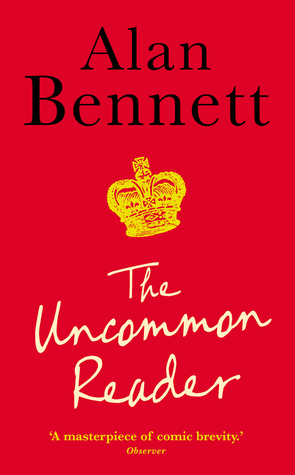There seems to be a trend for slim pocket volumes coming with exorbitant prices. First there was André Brink‘s The Blue Door and now it’s Alan Bennett’s The Uncommon Reader. Again, at £10.99 for such a slight volume, it was going to have to deliver the goods and, thankfully, it does,providing a humorous story that every reader should identify themself in.
One day, while walking her corgis around the palace grounds, the Queen happens upon a strange van parked by the kitchen doors. Heading in to apologise for the dogs’ noise she discovers it is the Westminster traveling library on its weekly visit to Buckingham Palace. Out of politeness, she borrows a book by Ivy Compton-Burnett, finds it “a little dry” and “too hard going altogether” and, without really intending to, checks out another book – Nancy Mitford’s The Pursuit Of Love – and soon Her Majesty becomes a reader, something which she could never claim to be before because, due to her obligations:
It was a hobby and it was in the nature of her job that she didn’t have hobbies. Jogging, growing roses, chess or rock-climbing, cake decoration, model aeroplanes. No. Hobbies involved preferences and preferences had to be avoided; preferences excluded people. One had no preferences. Her job was to take an interest, not to be interested herself.
Soon though, as the Queen voraciously works her way through a sizeable list of authors, from the classics of Dickens and Carroll, the poetry of Plath and Hardy, the ethnic contributions of Seth and Rushdie, and the likes of McEwan, Ishiguro and Brookner. There’s even time for biography and autobiography and history but, as any reader, from experience knows:
What she was finding also was how one book led to another, doors kept opening wherever she turned and the days weren’t long enough for the reading she wanted to do
With all this reading it’s only a matter of time before the Queen is more interested in having her nose in a book than attending to her duties. And who wouldn’t when there’s valid literary concerns such as attending to the classics? In reaction to her new hobby, those around her – equerries, the Prime Minister, etc. – conspire to nip this new habit in the bud and what follows is a light-hearted tale – of the reader’s versus the ignorant world around – leading up to a comedic conclusion that is simply perfect.
Add to the story a cast of characters daubed lightly but with an expert touch – the Duke of Edinburgh, in particular, evoked through a few choice mutterings – and you have a novella that by following the Queen’s literary awakening invites us to follow her journey and nod along as we recognise our own travels, taken or intended. The Uncommon Reader is well worth a read, even if, given how slight it is, it’s not worth the price.

Ooh, I quite fancy this. Agree about the price though. Amazon marketplace, here I come.